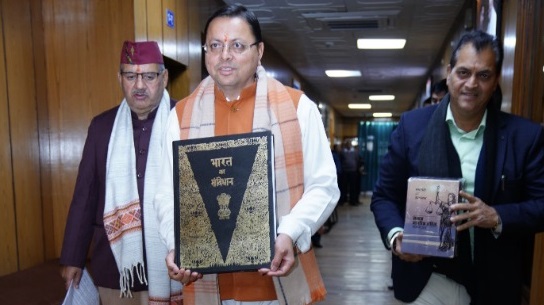Uttarakhand’s Landmark UCC Bill: A Breakdown of Provisions and Legal Significance- In a significant move towards legal reform, the Uttarakhand government has introduced a groundbreaking Uniform Civil Code (UCC) bill, heralding a new era of uniformity in personal laws. This progressive legislation aims to streamline diverse legal frameworks governing matters such as marriage, divorce, and inheritance, transcending religious boundaries. Let’s delve into the intricacies of this historic bill and its implications.
Uttarakhand’s Landmark UCC Bill: A Breakdown of Provisions and Legal Significance

Overview of the UCC Bill
- The 192-page UCC bill marks a paradigm shift in the legal landscape of Uttarakhand.
- It encompasses a wide array of provisions aimed at regulating personal matters uniformly, regardless of religious affiliations.
- If ratified, Uttarakhand would become the first state post-independence to implement such a comprehensive legal framework.
Provisions for Marriage and Divorce
- The bill mandates compulsory registration of marriages, providing legal recognition to live-in relationships for the first time.
- Polygamy and underage marriage practices, permitted under certain personal laws, are slated for abolition.
- Various forms of ‘talaq’ for divorce, prevalent in Muslim personal law, would be penalized under the proposed legislation.
Legal Recognition of Live-in Relationships
- The UCC bill defines live-in relationships and imposes obligations on couples to register them.
- Failure to register a live-in relationship within a stipulated period could lead to legal repercussions.
- Children born out of such relationships are granted legitimacy, with provisions for their welfare and rights.
Constitutional Implications and Supreme Court’s Stance
- The bill aligns with Article 44 of the Indian Constitution, advocating for a uniform civil code across the nation.
- Judicial precedents, including landmark cases like Shah Bano, have underscored the need for a UCC to mitigate conflicting personal laws.
Conclusion
The introduction of the UCC bill in Uttarakhand signifies a bold step towards harmonizing diverse legal frameworks, promoting equality, and upholding constitutional values. As the state navigates through uncharted legal territories, the bill’s constitutional validity and socio-legal implications are poised to spark debates and shape the future legal landscape. With its potential to pave the way for national integration and social cohesion, Uttarakhand’s UCC bill stands as a testament to the progressive ethos of legal reform in contemporary India.
ALSO READ-Uttarakhand Government’s Move Towards Uniform Civil Code: A Transformative Step